Table of Contents
A sensitive and perceptive translation.
Archibald MacLeish
Fresh and sharp... I think [Ciardis] version of Dante will be in many respects the best we have seen.
John Crowe Ransom
DANTE ALIGHIERI was born in 1265. Considered Italys greatest poet, this scion of a Florentine family mastered the art of lyric poetry at an early age. His first major work, La Vita Nuova (1292), was a tribute to Beatrice Portinari, the great love of his life. Dantes political activism resulted in his being exiled from Florence, and he eventually settled in Ravenna. It is believed that The Divine Comedy comprising three canticles, The Inferno, The Purgatorio, and The Paradiso was written between 1308 and 1320. Dante Alighieri died in 1321.
JOHN CIARDI was a distinguished poet and professor, having taught at Harvard and Rutgers universities, and a poetry editor of The Saturday Review. He was a Fellow of the American Academy of Arts and Sciences and the National Institute of Arts and Letters. In 1955, he won the Harriet Monroe Memorial Award, and in 1956, the Prix de Rome. He died in 1986.

SIGNET CLASSIC
Published by New American Library, a division of
Penguin Putnam Inc., 375 Hudson Street, New York, New York 10014, U.S.A.
Penguin Books Ltd, 27 Wrights Lane, London W8 5TZ, England
Penguin Books Australia Ltd, Ringwood, Victoria, Australia
Penguin Books Canada Ltd, 10 Alcorn Avenue, Toronto, Ontario, Canada M4V 3B2
Penguin Books (N.Z.) Ltd, 182-190 Wairau Road, Auckland 10, New Zealand
Penguin Books Ltd, Registered Offices: Harmondsworth, Middlesex, England
Published by Signet Classic, an imprint of New American Library, a division of Penguin Putnam Inc. Previously published in a Mentor edition.
Acknowledgment is made to Venture, Italian Quarterly, The Saturday Review, Between Worlds, The Massachusetts Review, New World Writing, and Arbor, in which excerpts from the present work first appeared.
First Signet Classic Printing, July 2001
Copyright John Ciardi, 1957, 1959, 1960, 1961
All rights reserved
 REGISTERED TRADEMARKMARCA REGISTRADA
REGISTERED TRADEMARKMARCA REGISTRADA
The Library of Congress has catalogued the Mentor edition of this title as follows: 61-18103.
Without limiting the rights under copyright reserved above, no part of this publication may be reproduced, stored in or introduced into a retrieval system, or transmitted, in any form, or by any means (electronic, mechanical, photocopying, recording, or otherwise), without the prior written permission of both the copyright owner and the above publisher of this book.
BOOKS ARE AVAILABLE AT QUANTITY DISCOUNTS WHEN USED TO PROMOTE PRODUCTS OR SERVICES. FOR INFORMATION PLEASE WRITE TO PREMIUM MARKETING DIVISION, PENGUIN PUTNAM INC., 375 HUDSON STREET, NEW YORK, NEW YORK 10014.
eISBN : 978-1-101-12735-3
http://us.penguingroup.com
To Dudley Fitts, Magister
Introduction
One of the qualities which distinguish Dantes ,Divine Comedy from most other long narrative poems is the individual character and, as it were, physiognomy peculiar to each of its three great divisions. Readers of the Inferno will recall its frequently harsh materialism, the great variety of intonation, the vivid realism, in which its ghostly figures rapidly seem to become people and the whole scene appears the hell on earth Dante probably wished it to represent.
To understand the Inferno, some historical background was obviously essential. It was important to know that Dante, by being born an upper-middle-class Alighieri in the independent commune of Florence in 1265, had inherited the political loyalties of a Guelph and that he had also acquired hereditary enemies called Ghibellines. The history of the civil strife between these parties was of equal importance, for, even if it culminated in a Guelph victory just after Dantes birth, talk of it and of fears lest it flare up again, filled his mind during his formative years. Outstanding members of the preceding generation of both parties such as the great Ghibelline Farinata degli Uberti, and the Guelph statesman and scholar Brunetto Latini, were to supply a number of his infernal figures, and allusions to victories, exiles, and defeats fill its pages.
Since participation in public life would determine Dantes fate, we had to be aware of new dissension among the Guelphs, now divided among themselves into Blacks and the Whites to which he belonged, and to follow the strange fatal parallel between his political progress and the growth of this new partisan strife. We saw the irony of his rise to the highest magistracy just as violence broke out in 1300, so his prominence made him a prime target for his foes.
What happened next, however, was of fundamental importance for all parts of the Comedy and, indeed, for all Dantes thinking thereafter. The Blacks schemed to interest the pope in intervening in the dispute. Boniface VIII, ever alert for an opportunity to strengthen his political influence, ignored the protests of the Whites, and invited a supposedly neutral third party, Charles of Valois, to enter Florence in the role of impartial arbitrator and peacemaker. What the popes secret orders had been became instantly apparent when Charles was admitted in November 1301. After seizing and disarming the Whites, he opened the gates to the banished Blacks, and stood by as they gave themselves over to murder and pillage. Dante was absent on a political mission and, fortunately for him and for posterity, he preferred exile to the sort of justice he would have faced had he returned.
This experience, crushing and embittering to most of its victimsand Dantes share of bitterness can be tasted in the Comedys invectives and many ironic allusionslaunched Dantes mind on one of its greatest drives: to understand the problem of evil, and to try to solve it. What could lead the head of the church, of all Christendom, vicar of the Christ who scorned the hypocrites and drove the money-changers and shopkeepers from the Temple, to engage in the fraud and perfidy of the Florentine conspiracy? How could such a man rise to such a position? What hope was there that men in general might be persuaded to a just life in this world and salvation in the next when they saw their spiritual leaders behave in such a way? Surely such a marvelously ordered physical universe, created for mans enjoyment, must contain somewhere a clue . to a better political organization or government than that of Dantes day.
Exploration of these questions led Dante through the Scriptures with their commentators, the Church Fathers, notably Anselm, Bonaventure, and Augustine, to Boethius and beyond to Lucan, Statius, Ovid, Horace, and his beloved and revered Virgil. Ciceros treatises were a wonderful discovery (like happening upon gold while looking for silver) but bristling with difficulties both stylistic and conceptual. This was the new and alien materialphilosophythat the church had repeatedly proscribed until the recent appearance of Aquinas Christian explanation of Aristotle.
The fruits of his long and painstaking exploration of the problem of evil formed the substance of Dantes Inferno. In this remarkable amalgam of the Nicomachaean Ethics and Cicero there is little that is peculiarly Christian except for a few borrowings from St. Thomas and the implicit application of St. Pauls Radix enim omnium malorum est cupiditas as the principle underlying the worst categories. It is not a theological arrangement but a philosophical one; not a theoretical expositionsave for the marvelously concise discourse of Virgil in Canto XI-but what might be called a case-system presentation of classic examples of evil in its outward social manifestations. The theoretical approach had already been tried in Dantes first work after his exile, the unfinished Banquet (Il Convivio). Here he had set out along the scholiasts favorite waya commentary on an established textwith the purpose of making available to the un-Latined the corpus of philosophy as he had found it. Yet when only about one-third complete, this ambitious task had been abandoned, with no word of explanation such as that which terminated his only preceding work, the Vita Nuova.
Next page
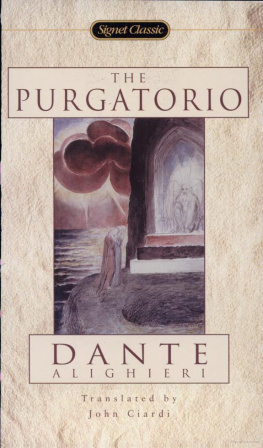
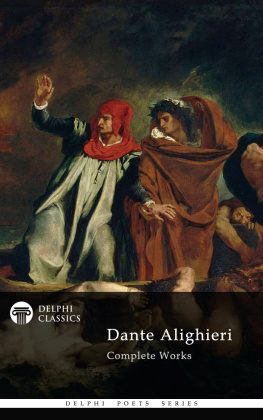
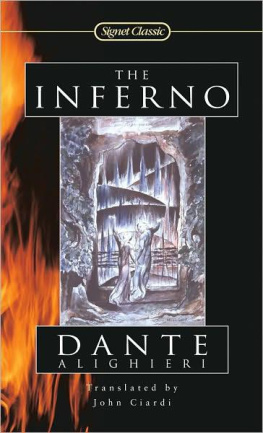
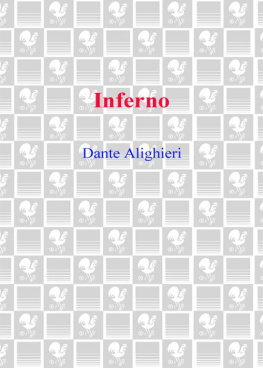
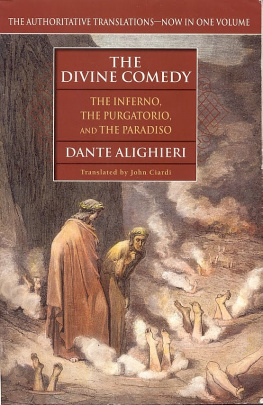
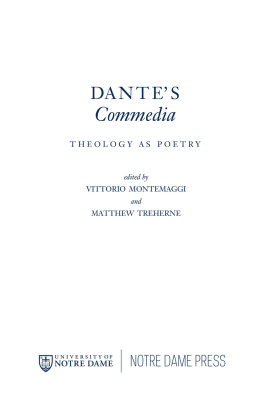
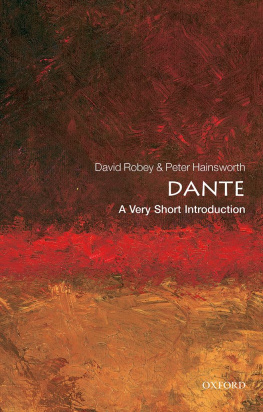
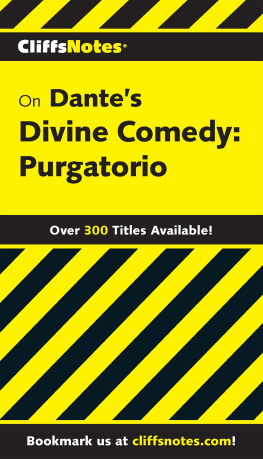

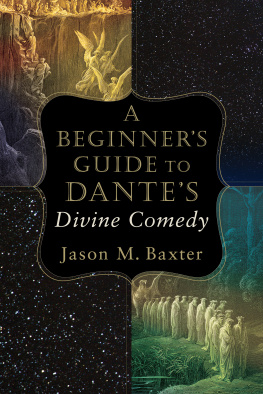
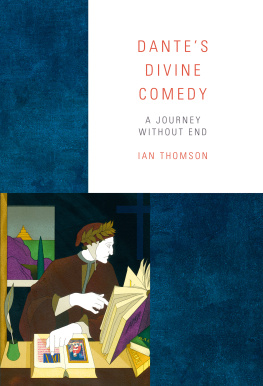
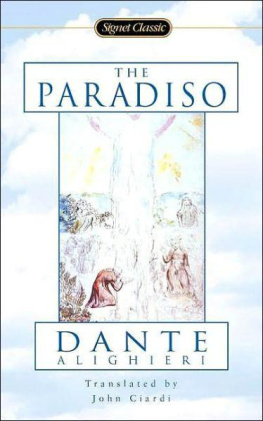

 REGISTERED TRADEMARKMARCA REGISTRADA
REGISTERED TRADEMARKMARCA REGISTRADA